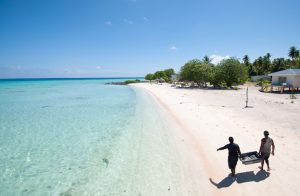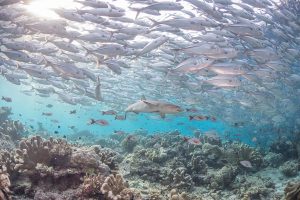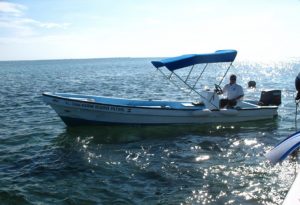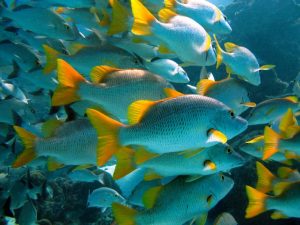Researchers develop user-friendly tool for improving ocean equity
January 28, 2026
 Three years in the making, the Ocean Equity Index is the brainchild of the Blue Justice Working Group, supported by France’s Foundation for Research on Biodiversity to develop feasible solutions to biodiversity loss and climate change. The team published its work in Nature on Jan. 28.
Three years in the making, the Ocean Equity Index is the brainchild of the Blue Justice Working Group, supported by France’s Foundation for Research on Biodiversity to develop feasible solutions to biodiversity loss and climate change. The team published its work in Nature on Jan. 28.
Rooted in research on environmental justice, conservation and ecosystems services, the tool incorporates standardized questions to assess matters of equity — such as human rights, accountability, and potential harms and benefits — through an ocean lens.
The first tool to assess and strengthen equity in ocean governance
January 28, 2026
 Sustainable Development Goals, the United Nations Agreement on the High Seas (UNAA), the Kunming-Montreal Global Biodiversity Framework – strong commitments have been made by governments and international organizations in recent years regarding social and environmental equity in ocean-related projects and decisions. However, progress in this area is significantly hampered by a lack of clarity on how to define, measure, and monitor equity.
Sustainable Development Goals, the United Nations Agreement on the High Seas (UNAA), the Kunming-Montreal Global Biodiversity Framework – strong commitments have been made by governments and international organizations in recent years regarding social and environmental equity in ocean-related projects and decisions. However, progress in this area is significantly hampered by a lack of clarity on how to define, measure, and monitor equity.
To address this challenge, an Ocean Equity Index ( OEI) has recently been developed by CNRS scientists within an international research team, with support from the Foundation for Biodiversity Research (FRB). The first global tool for measuring, comparing, and promoting equity in ocean-related initiatives, projects, and policies, it transforms an often abstract concept into a measurable and actionable standard.
Ocean Equity Index: the first tool to assess and strengthen equity in ocean governance
January 28, 2026
 Free and easy to use, this measurement tool is designed to be accessible to a wide range of stakeholders: local communities, indigenous populations, NGOs, scientists, industries, and governments.
Free and easy to use, this measurement tool is designed to be accessible to a wide range of stakeholders: local communities, indigenous populations, NGOs, scientists, industries, and governments.
Available online via a dedicated website and offline through a spreadsheet included in the publication, it uses twelve criteria to assign a score (from 0 to 3) to each initiative being analyzed; the total is expressed as a percentage of the maximum possible score.
Researchers Develop User-Friendly Tool for Improving Ocean Equity
January 28, 2026
 Let’s say an energy company is developing an offshore wind farm near a small First Nations fishing village. How can this company ensure that Indigenous rights are respected?
Let’s say an energy company is developing an offshore wind farm near a small First Nations fishing village. How can this company ensure that Indigenous rights are respected?
A flexible new tool called the Ocean Equity Index could help. Developed by an international team of researchers, the tool is designed to assess the extent to which ocean projects and policies recognize relevant stakeholders, include them in decision-making and otherwise treat them fairly.
Sustainable-use marine protected areas to improve human nutrition
September 17, 2024
This study explores sustainable-use MPAs, marine protected areas that allow some level of fishing, to improve the nutrition of communities around coral reef regions. With the 2030 international goal to cover 30% of the ocean with MPAs, the findings in this study will help inform how we can effectively and sustainably use these areas.

Should all marine reserves ban fishing? Not necessarily, new study shows
February 29, 2024
Marine protected areas intended to safeguard biodiversity in the ocean come in many different sizes and shapes. Some cover large swaths of the ocean, while others are smaller in scale. There are also differences among MPAs regarding their rules, particularly when it comes to fishing. Some MPAs allow certain forms of fishing; others ban it entirely or in some parts through what are known as no-take zones.
But are no-take MPAs more effective at boosting fish populations than multiple-use MPAs, which do allow some fishing? A new study suggests that both types can improve fish populations, depending on where and how they’re set up.

Protecting Fish Doesn’t Have to Mean Neglecting People, Study Concludes
February 26, 2024
BEAUFORT, N.C. – With fish stocks declining globally, more than 190 countries recently made a commitment to protect about a third of the world’s oceans within “Marine Protected Areas,” or MPAs by the year 2030. But these designated areas of the ocean where fishing is either regulated or outright banned can come at a huge cost to some coastal communities, according to a new analysis.

Protecting fish and communities should be balanced, concludes study of Marine Protected Areas
February 26, 2024
With fish stocks declining globally, more than 190 countries recently committed to protecting about one-third of the world’s oceans within Marine Protected Areas (or MPAs) by the year 2030. But these designated areas of the ocean – where fishing is either regulated or outright banned – can come at a huge cost to some coastal communities, according to a new analysis published in in the Proceedings of the National Academy of Sciences.
 Fish conservation does not have to mean neglecting people
Fish conservation does not have to mean neglecting people
February 26, 2024
Facing the global challenge of declining fish stocks, over 190 countries have committed to establishing marine protected areas (MPAs) covering around one-third of the world’s oceans by 2030. These designated zones, where fishing activities are regulated or prohibited, aim to support marine biodiversity recovery.
However, a recent study reveals the potential socioeconomic challenges these MPAs pose to coastal communities reliant on fishing for sustenance, income, and cultural heritage.
 ‘Blue Justice’ Is Essential for Building Coastal Resilience. New Study Shows
‘Blue Justice’ Is Essential for Building Coastal Resilience. New Study Shows
March 16, 2023
Climate change and rapid economic development have placed increased pressures on many coastal communities in recent years. Now, a new international study shows there is also a third force—the unintended consequences of conservation measures enacted with little or no consideration of local rights and needs—that can compound the harm. The study’s authors call the combined effects of these three forces a “triple exposure.”

February 2023
The Blue Justice working group publishes concurrent articles examining the linkages between ocean conservation, climate change, and equity.

The Duke Daily Check This Out! Swimming with Whale Sharks
David Gill films whale sharks to show the positive effects of marine protected areas
 We are proud to be part of Earth Optimism: an online event full of inspiring talks, powerful films, and practical solutions to help protect the future of our planet.
We are proud to be part of Earth Optimism: an online event full of inspiring talks, powerful films, and practical solutions to help protect the future of our planet.
Mar 25, 2021 at 8 PM EDT
 Congratulations to Miranda Bernard, a recipient of the 2021 David H. Smith Conservation Research Fellowship. Miranda Bernard will complete a project titled, “Justice and equity in marine protected areas: understanding the differential impacts of marine threats and management actions within coastal communities” under the academic mentorship of Dr. David Gill
Congratulations to Miranda Bernard, a recipient of the 2021 David H. Smith Conservation Research Fellowship. Miranda Bernard will complete a project titled, “Justice and equity in marine protected areas: understanding the differential impacts of marine threats and management actions within coastal communities” under the academic mentorship of Dr. David Gill
 Conservation that Benefits Both Fish and Humans
Conservation that Benefits Both Fish and Humans
November 11, 2020
“You want the impacts of these areas to be positive and equitable for all affected communities, but the marine environment is complex.” – David Gill
 The Importance of Evidence in Environmental Conservation
The Importance of Evidence in Environmental Conservation
November 12, 2018
 New study finds MPA effectiveness is greatest where there is adequate staff and funding
New study finds MPA effectiveness is greatest where there is adequate staff and funding
April 18, 2017
 Marine Protected Areas need more than just a name
Marine Protected Areas need more than just a name
April 11, 2017
 Marine protected areas suffer from lack of funds, staff
Marine protected areas suffer from lack of funds, staff
March 22, 2017
 The secret of successful marine protected areas? People.
The secret of successful marine protected areas? People.
March 22, 2017
